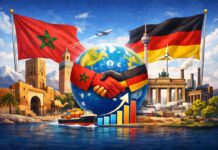Morocco has made clear its ambition to deepen its transport ties with Turkey, emphasizing a strategic push to better connect Africa to major Turkish logistics networks. Speaking in Istanbul during a session focused on Africa at the Global Transport Connectivity Forum, Moroccan officials outlined a vision rooted in sustainable development and integrated infrastructure.
At the heart of Morocco’s proposal is a push for structured South-South cooperation, with shared development goals, technology transfers, and joint investment in transport systems. According to Rabat, this framework is essential for building a productive and lasting partnership between the African continent and Turkey.
Key discussions centered on the possibility of creating direct logistics corridors linking major Turkish ports—such as Mersin, İskenderun, and Izmir—with African counterparts. Morocco is advocating for a seamless flow of goods and services between these ports and inland African markets, supported by an interconnected network of rail, road, sea, and air transport. To make this happen, Rabat is proposing the establishment of integrated logistics hubs and special economic zones, which it believes could strengthen regional value chains and improve efficiency.
Air transport was another major topic, with Moroccan officials highlighting the need to boost direct flight routes between African capitals. These air links are seen as essential for expanding trade, increasing the movement of people, and attracting investment—especially in sectors like tourism.
Morocco also plans to leverage its existing transport infrastructure, particularly the port complex at Tanger Med, which serves as a key gateway between Africa and Europe. Additional development projects in Nador and Dakhla are expected to bolster the country’s logistics capacity. Rabat hopes to draw on its public-private partnership experience and its strong economic and diplomatic ties across West and Central Africa, where Moroccan companies are already active in various sectors tied to logistics.
To facilitate cooperation, Morocco is calling for regular engagement between African and Turkish public and private stakeholders. The country has offered to co-host economic forums and joint workshops aimed at breaking down technical and regulatory barriers that still hinder collaboration.
Education and training also play a crucial role in Morocco’s vision. The country’s Higher Institute of Maritime Studies currently welcomes students from across Africa, and new partnerships with Turkish institutions are being explored. These would focus on areas such as logistics management, port operations, and digital innovation—skills that are increasingly vital for a modern transport sector.
For Morocco, the evolving relationship between Africa and Turkey represents more than just trade opportunities—it’s a strategic bet on a new, resilient Afro-Eurasian logistics zone. One that’s built to withstand global disruptions and operate with greater autonomy.
The forum, organized by Turkey’s Ministry of Transport and Infrastructure in collaboration with the World Bank, brought together high-level delegations from across the continent. Morocco participated with a senior delegation, reaffirming its commitment to reshaping regional connectivity in partnership with Turkey.





